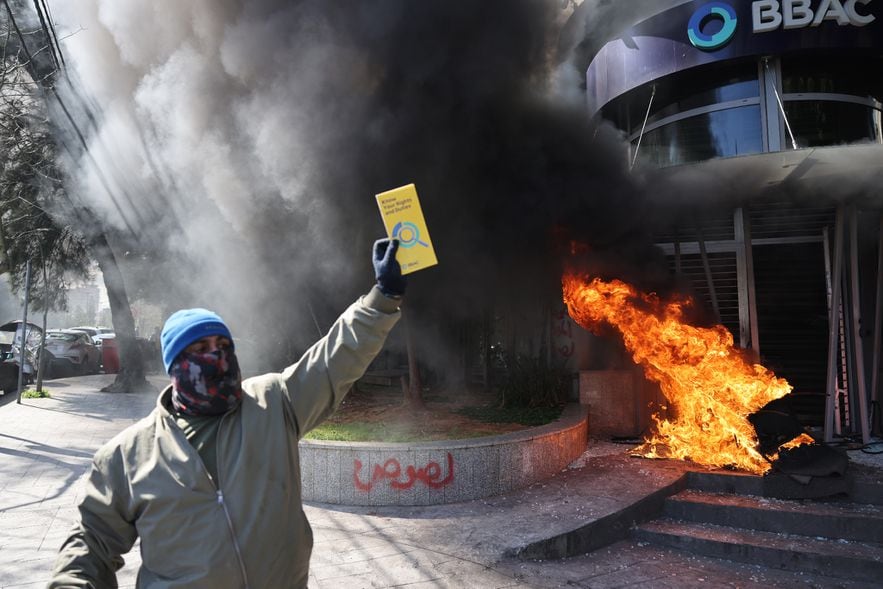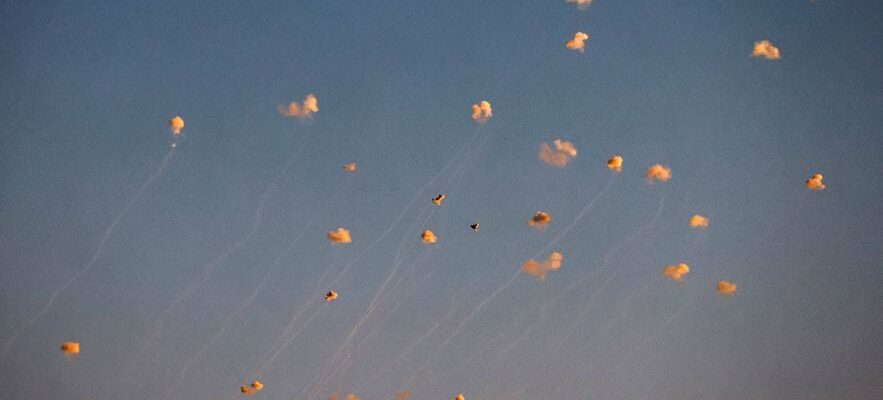In Lebanon, the pessimists have taken power. The UN speaks of “an apocalypse” to come, the United States “a disaster for the Middle East” and Israel a return of the Land of Cedar “to the Stone Age”. As if the worst was inevitable. As if a total war between Israel and Hezbollah, the radicalized Shiite militia which controls southern Lebanon, could no longer be avoided. Already, lovers of Lebanon are canceling their summer vacations in what was considered, not so long ago, as “the Switzerland of the Middle East”. However, as a European diplomat assures us, “the worst is never certain”.
Since October 7 and the massacres committed by Hamas in Israel, exchanges of fire have been daily on the Lebanese border. Nearly 100,000 Israeli civilians have been evacuated from the north of the country and 100,000 Lebanese from the south have fled the area. An exodus that has lasted for almost nine months.
In recent weeks, this low-intensity war between Hezbollah and Israel has been escalating, with verbal escalation, drones in enemy territory and an intensification of strikes. The situation seems ripe to degenerate into a global conflict. “Unfortunately, Hezbollah is not showing that it can behave responsibly,” sighs a Western diplomat who is closely following the issue. “It is showing the opposite. In the interest of Lebanon and the Lebanese, we must not resign ourselves to the inevitable, which would be a massive Israeli military operation.” Here are several reasons for hope.
1 – An immense risk for Israel
For years, Israeli officials have mentioned it during every meeting with foreign dignitaries: the greatest immediate threat to Israel is neither Hamas nor Iran, but the thousands of Hezbollah rockets on its northern border. , focused on the millions of inhabitants of its large cities. According to Israeli intelligence, the Lebanese militia has at least 150,000 missiles and rockets, and more than 100,000 soldiers. Capacities four to five times greater than those of Hamas, an organization which has resisted the Israeli army for nine months in the Gaza Strip. “Hezbollah’s main weapon today is no longer terrorism but its 150,000 rockets aimed at Israel and which would do much more damage than any attack,” underlines Christophe Ayad, journalist at World and author of Geopolitics of Hezbollah (at Puf, 2024). It is not 1200 Israeli civilians who are threatened, but at least 15,000…”
The power of Hezbollah would pose an insoluble problem for Israeli defense: how to counter the 2,500 to 3,000 rocket attacks that fall on the country every day, according to expert assessments? The Israeli Iron Dome may be one of the most effective anti-aircraft defense systems in the world, with an interception rate above 90%, but it will not be able to protect megacities from such a deluge of fire. “There is no doubt about the military and strategic superiority of Israel compared to Hezbollah, continues Christophe Ayad. But is Israel ready to bear the weight of the deaths of thousands of civilians in this war? It is a democratic society, therefore much more vulnerable than a theocratic movement which is ready to assume immense civilian losses and which behaves like a guerrilla, therefore believing that it is not accountable to the Lebanese population.”
Rockets fired from southern Lebanon intercepted by the Iron Dome, Israel’s anti-aircraft defense, in northern Israel on June 27, 2024
© / afp.com/Jalaa MAREY
2 – One front too many for the Israeli army
When is the best time to get rid of the Hezbollah threat? The question has been raging within the Israeli military establishment for years, but the debate has never been as heated as it has been since October 7. Some, like former chief of staff (and possible future prime minister) Benny Gantz, believe that the IDF “can plunge Lebanon completely into darkness and dismantle Hezbollah in a matter of days.”
Problem: The IDF has already been over-mobilized for nine months in the Gaza Strip, with Hamas resurfacing in areas that have been “cleansed,” and cannot disengage from the West Bank, where Palestinian groups are trying to start a revolt. “Israel faces a profound deficit of men to wage numerous simultaneous wars, wrote the newspaper Haaretz the last daysThe country must reflect on its conflict choices, while it still has the freedom to make those choices.”
With exhausted reservists, a nation traumatized by October 7 and an economy on its last legs, the Israeli government is necessarily hesitant to launch a costly offensive in the north. Humanly and morally. “Israel knows that by starting a war in Lebanon, the hoped-for result – the destruction of Hezbollah – is not assured,” points out Christophe Ayad. Besides, no one believes it.”
Not to mention the political consequences: within the government itself, a baroque alliance between the Likud right and the far right, positions appear far from clear-cut. An attack on Lebanon could disrupt this fragile political balance and cause its downfall. Especially since, contrary to appearances, Prime Minister Benjamin Netanyahu is not a go-getter for war, he who had never initiated large-scale conflicts before October 7, mainly for fear of losing them. “Netanyahu does not like war at all and he does it badly,” insists geopolitologist Frédéric Encel, author of The ways of power (Editions Odile Jacob, 2022). He always tried to avoid it, including against Hamas, with whom he only did it partially for years.”
3 – The threat of destruction of Lebanon
At least the risk of war has not taken away Lebanon’s legendary sense of humor. While Israeli officials promise to plunge the country of the Cedars “into darkness” in the event of an open conflict with Hezbollah, many Lebanese have noted that they already spend several hours a day in darkness due to the omnipresent power cuts in their homes. A symbol of the terrible economic and social situation that the country of the Cedars has been going through for years. “If Hezbollah continues to attack Israel, it will end badly for Lebanon,” warned a European diplomat. “The Lebanese unfortunately know from experience that Israeli operations in their country cause terrible damage for all Lebanese.” The last IDF intervention in Lebanon, in 2006, is considered by many to be the starting point of the vicious spiral into which the country is sinking every day.

Demonstrators vandalize banks in Beirut on February 16, 2023 to protest against the record drop in the Lebanese pound on the black market
© / afp.com/JOSEPH EID
For years, Lebanon has been facing an increasingly crazy economic crisis, with a middle class plunged into poverty and non-existent public services. “In Lebanon, other communities are increasingly making Hezbollah – and rightly so – responsible not only for a large part of the misfortunes since 2006 [NDLR : et la guerre contre Israël]but also the catastrophic socio-economic situation, relates Frédéric Encel. Hezbollah is sucking the life out of Lebanon, it is a state within a state. If it were to attract the wrath of Israel on the whole of Lebanon, Hezbollah would probably be even more contested.”
However, as the Middle East specialist notes, “Hezbollah is led by fanatics, but not by imbeciles.” “These are people who pursue violent policies, certainly, but pragmatic ones,” continues Frédéric Encel. “In the West, we too often confuse violent people with stupid people.” For its own political future, Nasrallah’s Hezbollah could therefore quickly bring down the escalation with the Israeli enemy.
4 – Hezbollah, a jewel far too precious for Iran
Despite its tens of thousands of fighters and its countless rockets, Hezbollah must still obey the orders of its master, the Iranian regime. Its finances, its weapons and its doctrine still arrive directly from Tehran. “The Islamic Republic considers Hezbollah as its son, it is the absolute reference of the militias that the Iranian regime seeks to set up in the Middle East, says Kasra Aarabi, research director at United Against Nuclear Iran. It is a invaluable asset placed just a few kilometers from the Israeli enemy.”
In the “axis of resistance” set up by Iran in the region, Hezbollah holds a special place. Its leader, Hassan Nasrallah, is almost considered a member of the Iranian regime, as he is close to Ayatollah Khamenei. Some rumors even make him a potential successor to the Iranian Supreme Leader, even though he is Lebanese… “Hezbollah is the last element that the Iranian regime would be ready to sacrifice in the event of a major confrontation with Israel, continues Kasra Aarabi. The Guardians of the revolution [NDLR : la force paramilitaire du Guide iranien] “Prefer that Hezbollah stay a bit in the background, while maintaining a level of engagement against Israel similar to what it began on October 7.”
Since the beginning of the war in the Gaza Strip, the Lebanese militia has been firing rockets every day at northern Israel, in order to maintain military pressure on the Hebrew state. This low-intensity war forces the IDF to maintain a presence on several fronts and not to launch all its forces against Hamas. A significant support for the Palestinian organization, but also an asset for Iran.
Geopolitologist Frédéric Encel nevertheless evokes a scenario in which the Iranian regime could push for confrontation, and thus risk losing its precious Lebanese militia. “A war between Hezbollah and Israel still seems improbable to me, but accidents are always possible, believes the Middle East specialist. The Islamic Republic, if it is in dire straits internally, will go all out externally and will confront Hezbollah and Israel.” The pessimists will then have been right.
.
